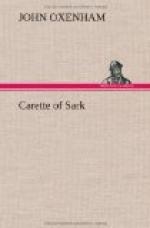So I answered them in French, in a voice that thundered in my head, that the explosion had deafened me and I could not hear a word they said. They understood and nodded cheerfully, and went on with their search.
Out of our whole ship’s company six only were saved, and not one of them officers.
In the first moments of safety the lack of hearing had seemed to me of small account, compared with the fact that I was still alive. But, as we turned and made for the ship, the strange sensation of hearing only through the feelings of the body grew upon me; the thought of perpetual silence began to appal me. I could feel the sound of the oars in the rowlocks, and the dash of the waves against the boat, but though I could see men’s lips moving it was all no more to me than dumb show.
They were busily cleaning the ship when we came aboard, but I could see what a great fight the Josephine had made of it. A long row of dead lay waiting decent burial, and every second man one saw was damaged in one way or another.
My companions were all more or less dazed, and probably deafened like myself. An officer questioned them, but apparently with small success. He turned to me, and I told him I could hear nothing because of the explosion, but I gave him all particulars as to the Josephine,—captain’s name, number of men and guns, and whence we came, and that was what he wanted.
In the official report the saving of six out of a crew of over three hundred was, I suppose, not considered worth mentioning. The Josephine, was reported sunk with all on board, and that, as it turned out, was not without its concern for me.
CHAPTER XXIII
HOW I LAY AMONG LOST SOULS
The ship we were on was the 48-gun frigate Swiftsure, and of our treatment we had no reason to complain. We were landed at Portsmouth two days later, drafted from one full prison to another, from Forton to the Old Mill at Plymouth, from Plymouth to Stapleton near Bristol, separated by degrees and circumstances, till at last I found myself one more lost soul in the great company that filled the temporary war prison, known among its inmates and the people of that countryside as Amperdoo.
It lay apart from humanity, in a district of fens and marshes, across which, in the winter time, the east wind swept furiously in from the North Sea, some thirty miles away. It cut like a knife—to the very bone. I hear it still of a night in my dreams, and wake up and thank God that after all it is only our own gallant south-wester, which, if somewhat unreasonably boisterous at times, and over fond of showing what it can do, is still an honest wind, and devoid of treachery. For we were but ill-clad at best, and were always lacking in the matter of fuel, and many other things that make for comfort. Whatever we might be at other times, when the east wind blew in from the sea we were, every man of us, ames perdues in very truth, and I marvel sometimes that any of us saw the winter through.




